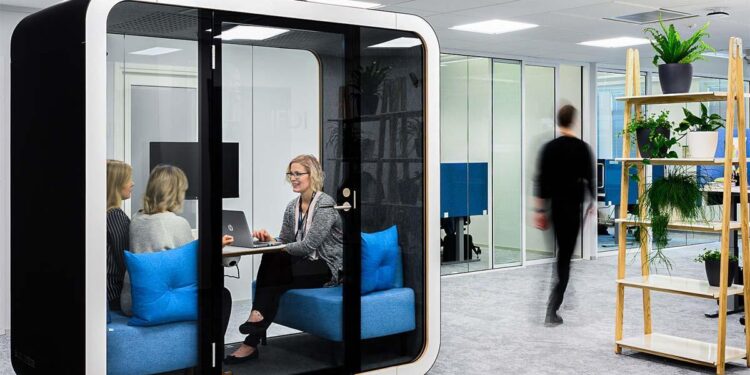In the bustling heart of Moscow, where the ceaseless rhythm of city life often collides with the need for privacy, a new solution has emerged to address the frustrations of busy commuters. Sound-proof booths designed for making phone calls are being installed in metro stations across the city, offering a secluded space for voice conversations amidst the chaos of daily travel. As Muscovites navigate their jam-packed schedules, these booths promise to enhance convenience by allowing for uninterrupted communication in a public setting, marked by the usual din of rushing passengers and train announcements. This innovative initiative reflects a growing awareness of the need for personal space in urban environments and highlights the city’s commitment to improving commuter experiences. As the first of these sound-proof booths are unveiled, many are eager to see how this development will transform the landscape of daily commutes.
Sound-Proof Booths Introduced in Moscow Metro to Enhance Privacy for Busy Commuters
In a bid to improve the daily commute for thousands of passengers, Moscow’s metro stations have recently unveiled sound-proof booths designed specifically for making phone calls. These quiet enclaves, equipped with modern amenities, offer a much-needed respite from the clamorous environment of bustling train platforms. Commuters can now engage in private conversations without the unwanted interruptions typically experienced in crowded public spaces. The initiative aims to cater to the increasing demands for personal space and a quieter travel experience among the city’s busy population.
The booths are already receiving positive feedback from users, who appreciate the added sense of privacy and comfort. Key features of these sound-proof spaces include:
- Sound insulation to minimize external noise
- Comfortable seating for longer conversations
- Charging ports for electronic devices
- Clear signage directing commuters to booth locations
As Moscow continues to innovate its public transport systems, these booths symbolize a growing recognition of the need for mental space amid the frenetic pace of urban life. With the successful implementation of these sound-proof booths, city officials are considering further enhancements to the metro experience to ensure that it meets the demands of modern commuters.
Exploring the Benefits of Acoustic Solutions in Urban Transit Environments
In bustling urban environments like Moscow, the clash of noise from trains, announcements, and hundreds of commuters can create an overwhelming atmosphere that complicates communication. Recognizing this challenge, the introduction of sound-proof booths in metro stations offers a thoughtful solution for busy individuals looking to connect without distractions. These glass-encased, acoustically designed spaces allow commuters to make phone calls in relative peace, reducing the auditory clutter that often permeates transit hubs. By isolating voices from the surrounding noise, these booths not only enhance personal privacy but also foster a more comfortable environment for everyone navigating the busy transit system.
The benefits of implementing acoustic solutions in urban transit environments extend beyond just improved clarity during conversations. These innovations can lead to a significant transformation in passenger behavior and overall satisfaction. A few notable advantages include:
- Enhanced Focus: Passengers can engage in important calls with minimal background noise interference.
- Stress Reduction: Reducing environmental noise can alleviate anxiety and improve the overall commuting experience.
- Increased Usability: The booths facilitate a more organized use of transit spaces, allowing individuals to conduct business efficiently even in the hustle and bustle of city life.
Recommendations for Future Expansion of Call Facilities in Public Transport Stations
To enhance the usability and comfort of public transport stations, it is crucial to consider the installation of additional sound-proof booths. These facilities not only align with the growing need for privacy among busy commuters but also provide a designated space for telephone conversations, minimizing disturbances to fellow passengers. Future expansion efforts should focus on the following key areas:
- Strategic Placement: Positioning booths near entrances and exits to maximize accessibility.
- High Demand Locations: Prioritizing busy interchange stations and areas with high foot traffic.
- Welcoming Design: Incorporating modern aesthetics that blend seamlessly into the station environment.
Furthermore, it would be beneficial to equip these booths with additional amenities to enhance the user experience. Suggestions for these facilities include:
- Charging Stations: Providing power outlets for mobile devices.
- Free Wi-Fi: Offering internet access to facilitate better communication.
- Real-Time Information Displays: Including screens that provide updates on train schedules.
| Feature | Description |
|---|---|
| Soundproofing | Reduces noise pollution for peaceful calls. |
| Privacy | A dedicated space to avoid public exposure. |
| Accessibility | Designed to cater to all users, including those with disabilities. |
Closing Remarks
As the bustling city of Moscow continues to adapt to the demands of its fast-paced environment, the introduction of sound-proof booths in metro stations marks a significant innovation in urban infrastructure. These booths not only offer a practical solution for the city’s busy residents eager to stay connected, but they also reflect a growing awareness of the need for personal space amid the chaos of daily commuting. As Muscovites embrace this new development, it serves as a reminder of how cities can evolve and enhance the quality of life for their inhabitants. With technology constantly advancing, such initiatives may pave the way for further improvements in public spaces designed to meet the needs of modern urban dwellers. For now, the sound-proof booths represent a small, yet impactful step towards a more considerate commuting experience in one of the world’s busiest metropolises.














